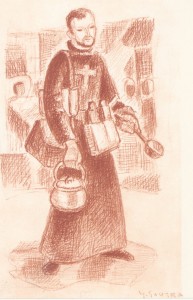 ‘And service to the sick poor even if plague-stricken, in their corporeal and spiritual needs, day and night, according to how he is commanded’
‘And service to the sick poor even if plague-stricken, in their corporeal and spiritual needs, day and night, according to how he is commanded’
It was through a good group dynamic that the terminology of service entered the history of Camillian vocation. Let us read Cicatteli:
‘As Camillus saw that his company was growing in numbers every day, and understanding in particular that many citizens and foreigners wanted to know who they were and what they were called, he thought it was a good idea, indeed necessary, to give them a name to make them more known about and to distinguish them from other Congregations. So one day when he was with all his companions, who at that time were not yet twelve in number, he suggested this idea to them. After talking a great deal about the matter, moved by their great charity towards the sick (who by them were seen as Lords and Masters), they almost resolved to call themselves the servants of the sick. But given that in the Church of the Almighty there was a religion that was called servants, so as not to create confusion they gave up that opinion. After Camillus observed that in the Holy Gospel reference was made on a number of occasions to the name of minister, to imitate Jesus Christ in his holy humility they were satisfied with calling themselves ‘the Ministers of the Sick’. By that name, from that moment onwards, the Congregation was always called, given that until that time it was called the company of Father Camillus’.
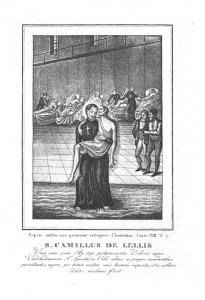 There thus became important the concept – dense in working forms – that care for the sick was not activity that was optional but, rather, necessary, and that the precept of love had to express itself in practical facts and not be reduced to words or remain at the level of pure doctrine. It is good to observe that the term ‘service’, a twenty-four carat Christian term, has been retrieved by some modern legislation dealing with health care. The Italian reform was entitled ‘national health-care service’ and the Canadian legislation defines as a ‘service’ the clinical resources that exist in a hospital: the x-ray service, the laboratory service, the nuclear medicine service, etc, even the pastoral service of religious assistance…
There thus became important the concept – dense in working forms – that care for the sick was not activity that was optional but, rather, necessary, and that the precept of love had to express itself in practical facts and not be reduced to words or remain at the level of pure doctrine. It is good to observe that the term ‘service’, a twenty-four carat Christian term, has been retrieved by some modern legislation dealing with health care. The Italian reform was entitled ‘national health-care service’ and the Canadian legislation defines as a ‘service’ the clinical resources that exist in a hospital: the x-ray service, the laboratory service, the nuclear medicine service, etc, even the pastoral service of religious assistance…
The concept of service is developed starting with the commandment to love one’s neighbour which is, together with love for God, the basic precept of the Christian life. Love for one’s neighbour cannot be reduced solely to doctrinal expressions, pronounced with fine lips with a wealth of arguments but separated from a context of concrete actions. It has to be translated at the level of facts into tangible works, into behaviour. If we read the Formula of Life against the light we find there the following words from the New Testament: ‘Each one…must use for the good of others the special gift that he has received from God’ (1 Pt 4:10); he should see himself as a ‘servant of the community’ (Col 1:25), a ‘servant of the new covenant’ (2 Cor. 3:6); a servant of justice (2 Cor 11:15); and of ‘Christ’ (2 Cor 11:23ss). Those who have an office (a clear reference to the service of deacon on a voluntary basis (see Acts 6:1ss), ‘must serve with the strength that God gives’ (1 Pt 4:11). We also read about the fundamental approach of Christ. ‘He came not to be served but to serve’ (Mt 20:28). He is not a man of command but, rather, of communion; not of the dissociation of people but of the status of service, to alleviate difficulties and spread in all the outlook of God, ‘completely over all’ (1 Cor 15:28); and not to make every diversity disappear but to ensure that the spirit of God is spread in the events of each person or in all human experiences.
Download here the Formula of Life, Testamentary Letter, the Transit, Spiritual exercises in the Formula of Life




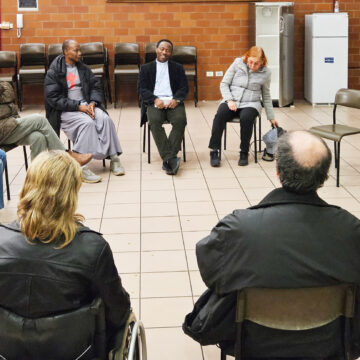
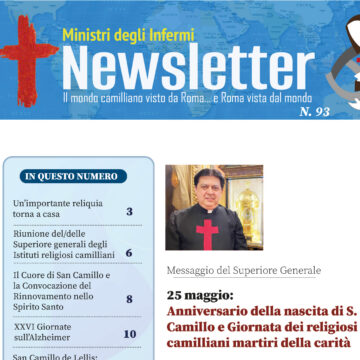




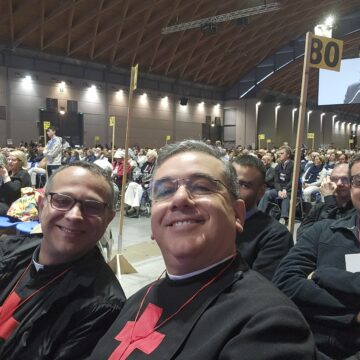

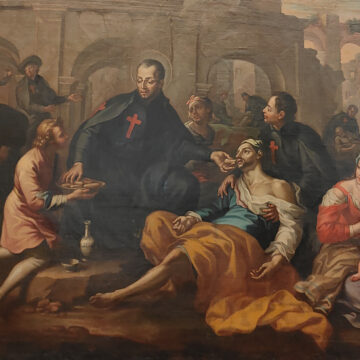


Camillians on Facebook
Camillians on Twitter
Camillians on Instagram